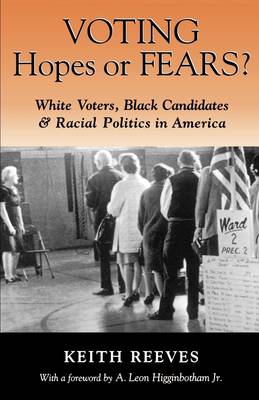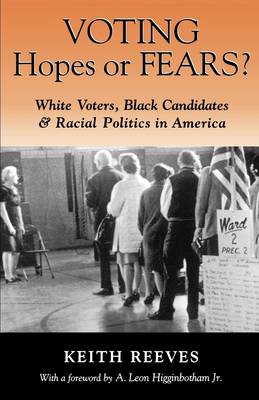
Vous voulez être sûr que vos cadeaux seront sous le sapin de Noël à temps? Nos magasins vous accueillent à bras ouverts. La plupart de nos magasins sont ouverts également les dimanches, vous pouvez vérifier les heures d'ouvertures sur notre site.
- Retrait gratuit dans votre magasin Club
- 7.000.000 titres dans notre catalogue
- Payer en toute sécurité
- Toujours un magasin près de chez vous
Vous voulez être sûr que vos cadeaux seront sous le sapin de Noël à temps? Nos magasins vous accueillent à bras ouverts. La plupart de nos magasins sont ouverts également les dimanches, vous pouvez vérifier les heures d'ouvertures sur notre site.
- Retrait gratuit dans votre magasin Club
- 7.000.0000 titres dans notre catalogue
- Payer en toute sécurité
- Toujours un magasin près de chez vous
Voting Hopes or Fears?
White Voters, Black Candidates & Racial Politics in America
Keith Reeves
Livre broché | Anglais
42,95 €
+ 85 points
Description
When President Lyndon B. Johnson signed the 1965 Voting Rights Act, he explained that it flowed from "a clear and simple wrong." But a generation later, whites still remain resistant to the election of blacks to public office. That widespread resistance, Keith Reeves illustrates, can be explained in large part by election campaign appeals to whites' racial fears and sentiments. Based on empirical research examining white voters' attitudes towards black candidates and racial framing of campaign news coverage, Voting Hopes or Fears? explosively documents that racial discrimination against black candidates is contemporary, specific, and identifiable. Reeves concludes by outlining possible remedies such as modified at-large voting systems and by defending the practice of race-conscious legislative districting, now under attack by the Supreme Court. Marshaling startling evidence of voting discrimination against black candidates on account of race, and featuring a Foreword by The Honorable A. Leon Higginbotham Jr., Chief Justice Emeritus of the US Court of Appeals, Voting Hopes or Fears? will be mandatory reading for political and social scientists, scholars of racism and African-American Studies, civil rights litigators, journalists, black lawmakers and office-seekers, and general readers interested in the subject of race and politics in American society.
Spécifications
Parties prenantes
- Auteur(s) :
- Editeur:
Contenu
- Nombre de pages :
- 200
- Langue:
- Anglais
Caractéristiques
- EAN:
- 9780195101621
- Date de parution :
- 23-10-97
- Format:
- Livre broché
- Format numérique:
- Trade paperback (VS)
- Dimensions :
- 138 mm x 206 mm
- Poids :
- 254 g







